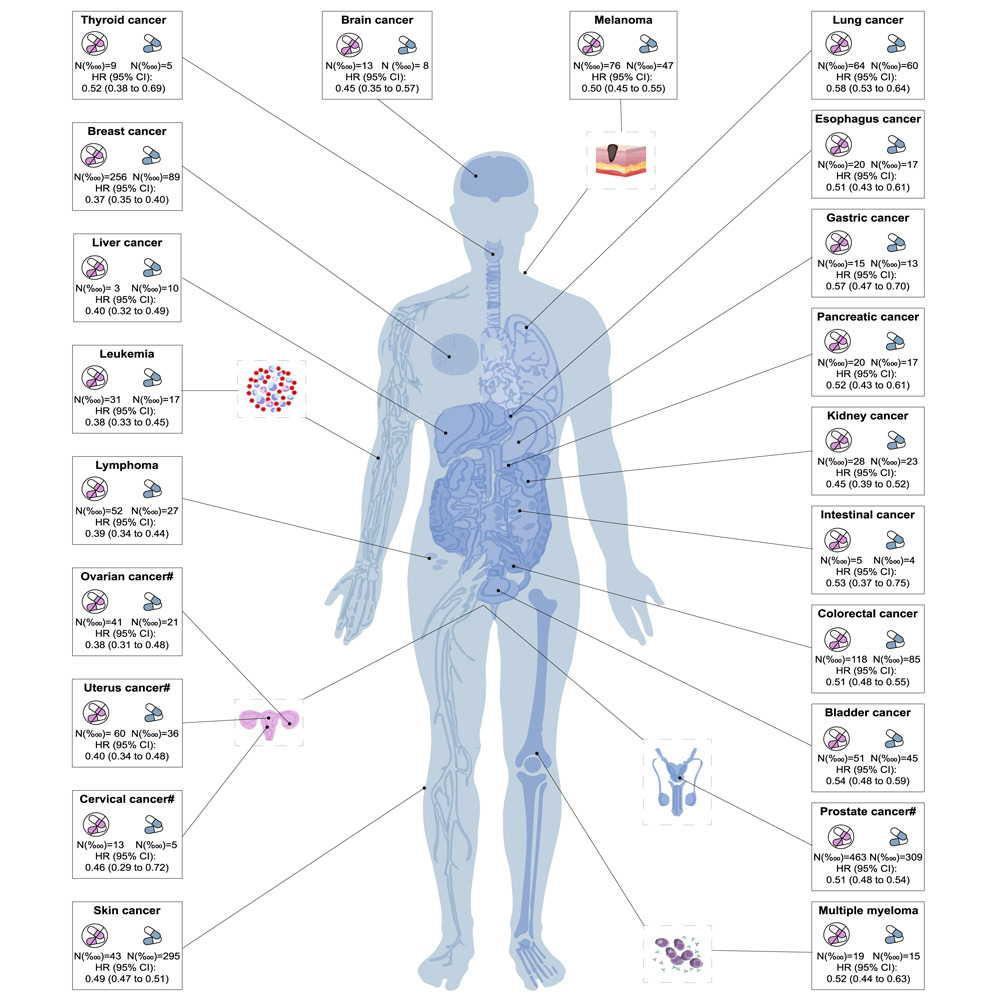Statins Reduce the Risk of 21 Cancers
Lipid-lowering drugs are associated with a decreased risk of 21 types of cancers in older adults.
Highlights:
- Lipid-lowering drugs like statins reduce the risk of 21 types of cancers, including lung, brain, and reproductive system cancers.
- In addition to changing one’s lifestyle, lipid-lowering drugs may act as a preventative measure against cancer.
Everyone hates cancer and now scientists are coming closer to preventing it. By analyzing over 380,000 individuals from the UK using “the world’s most important health research database,” called the UK Biobank, Chinese scientists have found that lipid-lowering drugs reduce the risk of 21 types of cancers. The findings suggest lipid-lowering drugs can prevent cancer development in multiple tissues and organs, potentially leading to a longer life.
Lipid-Lowering Drugs Mitigate Incidence of 21 Cancer Types
Lipids are organic molecules that don’t mix with water, including fat and cholesterol. As such, lipid-lowering drugs lower the concentration of fats and cholesterol in the bloodstream. The most widely prescribed lipid-lowering drug class is statins, which lower LDL cholesterol. Accordingly, lipid-lowering drugs are usually prescribed to individuals with high cholesterol, which was reflected in the measurements taken from the participants of the study.
Compared to the participants taking lipid-lowering drugs, the participants on lipid-lowering drugs had higher blood glucose, total cholesterol, triglyceride (fat), and LDL levels. They also had a higher body mass index (BMI), waist circumference, and hip circumference, indicating excess fat. Additionally, the participants on lipid-lowering drugs had higher blood pressure and were more likely to smoke and drink compared to participants not on lipid-lowering medication.
Main Findings
Remarkably, the researchers found that individuals on lipid-lowering drugs, particularly statins, had a lower risk of leukemia, lymphoma, multiple myeloma, melanoma, prostate, ovarian, uterus, cervical, breast, lung, liver, esophagus, gastric, intestinal, colorectal, skin, bladder, kidney, thyroid, pancreatic, and brain cancers. Notably, the risk of various sex-specific cancers was lowered by the following:
- Prostate: 49%
- Ovarian: 61%
- Uterus: 59%
- Cervical: 54%

The lipid-lowering drugs were also associated with a decreased risk of death from cancer. These findings demonstrate that lipid-lowering drugs can reduce the risk of 21 types of cancers and death from cancer, suggesting that lipid-lowering drugs can potentially delay death from cancer.
Preventing Cancer in its Tracks
Cancer is devastating to families and society. Thus, preventing it can alleviate needless suffering. This means taking action during the earlier stages of life, as it is difficult to know when cancer may develop.
Lifestyle
Up to 50% of preventable cancers are a result of the foods we eat. Avoiding red meat and embracing a whole-food, plant-based diet can help prevent some cancers. Avoiding alcohol can reduce the risk of breast, colon, lung, kidney, and liver cancers. In addition to watching the foods we eat, maintaining a healthy weight can lower the risk of breast, prostate, lung, and colon cancers. With that being said, partaking in 150 minutes of moderate or 75 minutes of vigorous exercise each week is recommended for cancer prevention.
Not consuming tobacco and wearing sunscreen can also prevent cancer. Tobacco is attributed to 30% of all cancer-related deaths and is linked to lung, mouth, esophageal, pancreatic, bladder, cervical, and kidney cancers. Thus, not smoking tobacco can help to mitigate cancer. When it comes to skin cancer, this cancer type is the most preventable yet the most common in the US. In addition to using sunscreen, staying out of direct sunlight between 10 am and 4 pm is an effective way to avoid high levels of ultraviolet radiation.
Screenings
Undergoing various screening tests can potentially prevent several cancers. These include colorectal cancer (colonoscopy), lung cancer (if a smoker), and breast cancer (mammogram). Detecting cancer before it progresses can allow for its removal.
Drugs
Interestingly, that lipid-lowering drugs, such as statins, reduce the risk of 21 types of cancers in individuals from the UK biobank suggests that lipid-lowering drugs may prevent these cancers. The Chinese researchers also conducted a meta-analysis of 35 studies showing that lipid-lowering drugs reduce cancer incidence in the US, Korea, France, Japan, the UK, China, Israel, Finland, and Canada. Previous studies have also shown that statins reduce the risk of cancer. Other than lowering lipids, lipid-lowering drugs may also work through other mechanisms, such as reducing systemic inflammation.
Overall, the study’s results add to the anti-aging benefits of statins, which lower the risk of atherosclerosis — the number one leading cause of death in the US. By lowering the risk of cancer and heart disease, statins could be a life-prolonging class of drug.

